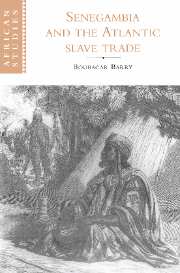Book contents
- Frontmatter
- Contents
- Preface
- Map
- I Senegambia from the fifteenth to the seventeenth century: a haven for incoming populations, a station for migrants on the move
- II Senegambia in the eighteenth century: the slave trade, ceddo regimes and Muslim revolutions
- III Senegambia in the first half of the nineteenth century: legitimate trade and sovereignty disputes
- 9 The crisis of the trans-Atlantic trading system and the triumph of legitimate trade in the first half of the nineteenth century
- 10 Popular rebellions and political and social crises in Futa Jallon
- 11 Futa Jallon expansion into the Southern Rivers region
- 12 The colony of Senegal and political and social crises in northern Senegambia
- 13 Defeat of the holy warriors in northern Senegambia
- IV Senegambia in the second half of the nineteenth century: colonial conquest and resistance movements
- Conclusion
- Notes
- Bibliography
- Index
- Other books in the series
12 - The colony of Senegal and political and social crises in northern Senegambia
Published online by Cambridge University Press: 31 October 2009
- Frontmatter
- Contents
- Preface
- Map
- I Senegambia from the fifteenth to the seventeenth century: a haven for incoming populations, a station for migrants on the move
- II Senegambia in the eighteenth century: the slave trade, ceddo regimes and Muslim revolutions
- III Senegambia in the first half of the nineteenth century: legitimate trade and sovereignty disputes
- 9 The crisis of the trans-Atlantic trading system and the triumph of legitimate trade in the first half of the nineteenth century
- 10 Popular rebellions and political and social crises in Futa Jallon
- 11 Futa Jallon expansion into the Southern Rivers region
- 12 The colony of Senegal and political and social crises in northern Senegambia
- 13 Defeat of the holy warriors in northern Senegambia
- IV Senegambia in the second half of the nineteenth century: colonial conquest and resistance movements
- Conclusion
- Notes
- Bibliography
- Index
- Other books in the series
Summary
The crisis of the trans-Atlantic trading system, the failure of various colonial plantation schemes, and the ruinously speculative gum trade soon led to sovereignty disputes between France and the northern Senegambian states, where profound economic, political, and social changes had been taking place.
In Waalo, the introduction of colonial plantation agriculture plunged the local aristocracy into civil war. Already bickering, they became more sharply divided over the sharing of new customs duties paid by the Saint-Louis traders. The political crisis in turn opened the gates to the revival of the marabout movement. Led by Njaga Issa and his disciple Diile Fatim Cham, the movement declared a holy war in 1830. Civil war, together with the occupation of Waalo by the Trarza Moors and the deep trade depression, gave Faidherbe an opportunity to begin the process of colonial conquest in 1854. The French wanted to stop paying customs duties at their trading posts on the Senegal River. They also wanted to create secure trading conditions. Their practical determination to conquer the Senegal valley as a passageway to the resources of the Niger Bend, however, coincided with Shaykh Umar's jihad. That holy war plunged all Senegambia into turmoil.
In Futa Toro, Shaykh Umar crystallized discontent among a population tired of increasing inequalities within the Toorodo regime, whose practices now fell short of the ideals of the triumphant eighteenth-century revolution that had brought it to power.
- Type
- Chapter
- Information
- Senegambia and the Atlantic Slave Trade , pp. 177 - 194Publisher: Cambridge University PressPrint publication year: 1997



